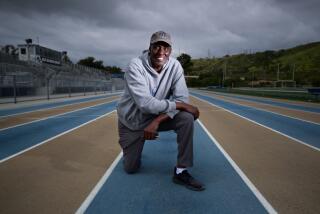The Download: Seeking a competitive edge in sports via IBM Watson

IBM Watson, which has competed on “Jeopardy!” and created recipes for a new Chef Watson cookbook, has a new career calling: becoming a sports coach for some elite athletes.
IBM Watson, which has competed on “Jeopardy!” and created recipes for a new Chef Watson cookbook, has a new career calling: becoming a sports coach for some elite athletes. In a partnership involving the Irish biomarker analysis company Orreco and the Oregon Track Club, “Coach Watson” will help to optimize the performance of the elite runners in one of America’s top running clubs.
In many ways, the Coach Watson initiative is similar to other efforts to use data to enable peak athletic performance, but with one critical difference: Coach Watson will have at its disposal the supercomputing potential of IBM Watson to make sense of it all. After all, it’s one thing to generate a lot of data; it’s another thing entirely to find the needle in the haystack and then make the recommendation actionable.
Orreco, which has been working with the Oregon Track Club for more than six years and which recently joined the growing IBM Watson ecosystem, will teach Watson how to combine physiological test data, biomarker data and data on nutrition and sleep into an individualized training program that the Oregon Track Club can use to optimize the schedules and performance of its runners. In addition, Coach Watson will be able to analyze the latest research findings from medical journals.
In doing so, Coach Watson will help to answer questions like “how hard” or “how long” a workout should be, whether an athlete experiencing fatigue should lower the intensity of workouts or take a few days off to recover, and how to optimize sleep schedules around travel. Coach Watson might also be able to spot signs of an upcoming injury weeks in advance through the continuous monitoring of biomarker data (for example, an iron deficiency in the blood).
It’s still a work in progress — Orreco chief executive Brian Moore told me that Watson is still a “junior coach coming up through the ranks” — but based on Watson’s previous success at extracting unexpected relationships from the data and proven ability to do trade-off analysis, there’s definitely potential for Coach Watson to provide an extra layer of knowledge for coaches.
Mark Rowland, the head coach for Oregon Track Club Elite, himself a former Olympic medalist who now has his own data-inspired hashtag (#RowKnowsMore), views Coach Watson as more of a coaching assistant than a competitor, according to Moore. Partnering with Coach Watson will be a way for Rowland to keep up to date with the latest research, to support his gut instincts with data-driven decisions, and to make sense of all the physiological and biomarker data that are now possible to collect from athletes to gain a competitive edge.
“We all know there is no shortage of data in professional sports,” Rowland says. “The challenge always is in making the data and information actionable. I can see Coach Watson becoming an invaluable resource for both coaches and athletes alike. Initially, we plan to use Coach Watson to help us keep up to date with the latest research in important topics like sleep, recovery, altitude training and performance nutrition.”
In terms of optimizing performance, the goal of Coach Watson is to ensure that each athlete is in a zone of peak performance on the day of a competition. Being in the zone could mean the difference between taking home a medal or not at a competition, or the difference between having a “good” training session and a “bad” training session.
It’s not just quantitative data that Coach Watson can analyze. There is a lot of unstructured data, says Moore, that Coach Watson can take into account — such as travel schedule, the attritional effect of a long season, work and family stress, and body recovery time — in order to ensure that an athlete is always at his or her peak.
Reducing injuries is another way that Coach Watson can help to make the world’s best athletes even better. That’s an especially big consideration for sports teams that stand to lose tens of millions of dollars in contract value from players sitting on the bench rather than performing. That’s a problem that Coach Watson will help to solve by balancing the trade-offs between, say, training hard for a short time, or cutting back on training entirely to reduce the chance of an injury.
Ultimately, it will be up to the athletes whether Coach Watson works. Data without insights are just data.
Moore, who grew up fascinated by the dominance of East African long-distance runners, thinks Coach Watson might finally be able to crack the secret of why runners from certain countries consistently perform better than others. The reason, Moore shared with me, is that Coach Watson does not rely on myth — “They are running to school every day at an early age” — and only on data when coming up with recommendations. In addition to factors such as “altitude exposure,” Coach Watson might be able to find some unexpected factors as well (just as Chef Watson discovered some creative recipe combinations).
And while Coach Watson will roll out first with the Oregon Track Club Elite, there are clear potential opportunities for other segments of the sports world. Orreco, for example, has already partnered with some of the biggest names in the European sports world, including teams from Britain’s Premier League.
For Orreco, the partnership with Oregon Track Club Elite is one way to establish a beachhead in the North American sports market. Next up, Moore envisions new partnerships with the NBA and MLB, both of which have embraced the “moneyball” approach to sports. Imagine star baseball and basketball players, being aided by IBM Watson to achieve peak performance and spending less time on the bench dealing with nagging injuries.
While the initial deployment is for elite athletes, it’s easy to see how Coach Watson could be applied to weekend athletes training for the local 10K or a corporate softball league. Weekend warriors could be able to optimize workout schedules with proper sleep and nutrition to be ready for the big day.
As Moore told me, at the amateur level, Coach Watson would be more about maximizing the enjoyment from physical activity. There’s a common training phenomenon — people train harder and longer, but start to see diminishing returns past a certain point. That’s frustrating — not to be able to set personal bests despite applying more effort. Coach Watson might be able to recommend a customized training regime that can find out what you are doing wrong, and correct it.
According to Lauri Saft, who oversees the IBM Watson ecosystem, the requests continue to come in at IBM to use cognitive computing at all stages of the athletic lifecycle, in areas such as nutrition, training and even team dynamics. Being able to make sense of the data, she says, is a key to optimizing both the performance of the athlete and the experience of the fan. As a result, expect even more entrepreneurs and start-ups to come forward that recognize the power of data to transform the future of the sports industry.
Basulto covers technology for the Washington Post.
More to Read
Inside the business of entertainment
The Wide Shot brings you news, analysis and insights on everything from streaming wars to production — and what it all means for the future.
You may occasionally receive promotional content from the Los Angeles Times.










